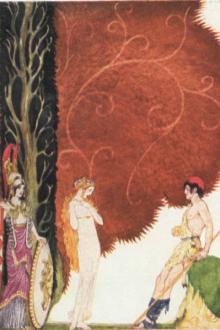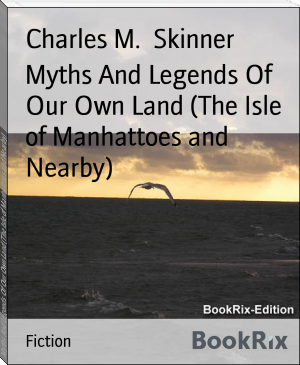The Adventures of Odysseus and The Tales of Troy - Padraic Colum (i read books .txt) 📗

- Author: Padraic Colum
- Performer: -
Book online «The Adventures of Odysseus and The Tales of Troy - Padraic Colum (i read books .txt) 📗». Author Padraic Colum
When he spoke, giving such tokens of Odysseus, Penelope wept again. And when she had wept for a long time she said:
'Stranger, thou wert made welcome, but now thou shalt be honoured in this hall. Thou dost speak of the garments that Odysseus wore. It was I who gave him these garments, folding them myself and bringing them out of the chamber. And it was I who gave him the brooch that thou hast described. Ah, it was an evil fate that took him from me, bringing him to Troy, that place too evil to be named by me.'
Odysseus leaned towards her, and said, 6 Do not waste thy heart with endless weeping, lady. Cease from lamentation, and lay up in thy mind the word I give thee. Odysseus is near. He has lost all his companions, and he knows not how to come into this house, whether openly or by stealth. I swear it. By the hearth of Odysseus to which I am come, I swear that Odysseus himself will stand up here before the old moon wanes and the new moon is born.'
'Ah, no,' said Penelope. 'Often before have wanderers told me such comfortable things, and I believed them. I know now that thy word cannot be accomplished. But it is time for thee to rest thyself, stranger. My handmaidens will make a bed for thee in the vestibule, and then come to thee and bathe thy feet.'
Said Odysseus, 'Thy handmaidens would be loath to touch the feet of a wanderer such as I. But if there is in the house some old wife who has borne such troubles as I have borne, I would have my feet bathed by her.'
Said Penelope, 'Here is an ancient woman who nursed and tended that hapless man, Odysseus. She took him in her arms in the very hour he was born. Eurycleia, wash the feet of this man, who knew thy lord and mine.'
Thereupon the nurse, old Eurycleia, fetched water, both hot and cold, and brought the bath to the hearth. And standing before Odysseus in the flickering light of the fire, she said, 'I will wash thy feet, both for Penelope's sake and for thine own. The heart within me is moved at the sight of thee. Many strangers have come into this hall, but I have never seen one that was so like as thou art to Odysseus.'
Said Odysseus, 'Many people have said that Odysseus and I favour each other.'
His feet were in the water, and she put her hand upon one of them. As she did so, Odysseus turned his face away to the darkness, for it suddenly came into his mind that his nurse, old Eurycleia, might recognize the scar that was upon that foot.
How came it there, that scar? It had been made long ago when a boar's tusk had ripped up the flesh of his foot. Odysseus was then a youth, and he had gone to the mountain Parnassus to visit there his mother's father.
ne morning, with his uncles, young Odysseus went up the slope of the mountain Parnassus, to hunt with hounds. In a thick lair a mighty boar was lying. When the sound of the men's trampling came near him, he sprang up with gleaming eyes and stood before them all. Odysseus, holding his spear in his hands, rushed upon him. But before he could strike him, the boar charged, ripping deep into his flesh with his tusk. Then Odysseus speared him through the shoulder and the boar was slain. His uncles staunched the wound and he stayed with them on the mountain Parnassus, in his grandfather's house, until the wound was healed.
And now, as Eurycleia, his old nurse, passed her hands along the leg, she let his foot drop suddenly. His knee struck against the bath, and the vessel of water was overturned. The nurse touched the chin of Odysseus and she said, 'Thou art Odysseus.'
She looked to where Penelope was sitting, so that she might make a sign to her. But Penelope had her eyes turned away. Odysseus put his hand on Eurycleia's mouth, and with the other hand he drew her to him.
'Woman,' he whispered. 'Say nothing. Be silent, lest mine enemies learn what thou knowest now.'
'Silent I'll be,' said the nurse Eurycleia. 'Thou knowest me. Firm and unyielding I am, and by no sign will I let anyone know that thou hast come under this roof.'
So saying she went out of the hall to fetch water in the place of that which had been spilt. She came back and finished bathing his feet. Then Odysseus arranged the rags around his leg to hide the scar, and he drew the bench closer to the fire.
Penelope turned to him again, 'Wise thou art, my guest,' she said, 'and it may be that thou art just such a man as can interpret a dream that comes to me constantly. I have twenty geese in the yard outside. In my dream I see them, and then a great eagle flies down from the mountains, and breaks their necks and kills them all, and lays them in a heap in this hall. I weep and lament for my geese, but then the eagle comes back, and perching on a beam of the roof speaks to me in the voice of a man. "Take heart, O wife of Odysseus," the eagle says, "this is no dream but a true vision. For the geese that thou hast seen are thy wooers, and I, that appeared as an eagle, am thy husband who will swiftly bring death to the wooers." Then the dream goes, and I waken and look out on the daylight and see my geese in the courtyard pecking at the wheat in the trough. Canst thou interpret this dream?'
'Lady,' said Odysseus, 'the dream interprets itself. All will come about as thou hast dreamed.'
'Ah,' said Penelope, 'but it cannot now, for the day of my woe is at hand. I am being forced by my parents to choose a husband from the wooers, and depart from the house of Odysseus.'
'And how wilt thou choose from amongst them?' said Odysseus.
'In this way will I make choice,' said Penelope. 'My husband's great bow is still in the house. The one who can bend that bow, and shoot an arrow through the holes in the backs of twelve axes set one behind the other—him will I choose for my husband.'
Said Odysseus, 'Thy device is good, Penelope, and some god hath instructed thee to do this. But delay no longer the contest of the bow. Let it be to-morrow.'
'Is that thy counsel, O stranger?' said Penelope.
'It is my counsel,' said Odysseus.
'I thank thee for thy counsel,' she said. 'And now farewell, for I must go to my rest. And do thou lie down in the vestibule, in the bed that has been made for thee.'
So Penelope spoke, and then she went to her chamber with her handmaidens. And in her bed she thought over all the stranger had told her of Odysseus, and she wept again for him.
XIIIll night Odysseus lay awake, tossing this side and that, as he pondered on how he might slay the wooers, and save his house from them. As soon as the dawn came, he went into the open air and, lifting up his hands, prayed to Zeus, the greatest of the gods, that he might be shown some sign, as to whether he would win victory or meet with defeat.
And then, as he was going within the house, he heard the voice of a woman who ground barley-meal between stones. She was one of twelve, but the other women had fallen asleep by the quern-stones. She was an ancient, wretched woman, covered all over with the dust of the grain, and, as Odysseus came near her, she lifted up her hands and prayed in a weak voice:
'O Zeus, even for miserable me, fulfil a prayer! May this be the last day that the wooers make their feast in the house of Odysseus! They have loosened my knees with the cruel toil they have made me undergo, grinding for them the barley for the bread they eat. O Zeus, may they to-day sup their last!'
Thus the quern-woman spoke, as Odysseus crossed his threshold. He was glad of her speech, for it seemed to him her words were an omen from Zeus, and that vengeance would soon be wrought upon the proud and hard-hearted men who wasted the goods of the house and oppressed the servants.
And now the maids came into the hall from the women's apartment, and some cleaned the tables and others took pitchers and went to the well for water. Then men-servants came in and split the fagots for the fire. Other servants came into the courtyard—Eumæus the swineherd, driving fatted swine, the best of his drove, and Philœtius the cattle-herd bringing a calf. The goatherd Melanthius, him whom Odysseus and Eumæus had met on the road the day before, also came, bringing the best goats of his flock to be killed for the wooers' feast.
When the cattle-herd, Philœtius, saw a stranger in the guise of a beggar, he called out as he tethered the calf in the yard, 'Hail, stranger friend! My eyes fill with tears as I look on thee. For even now, clad as thou art in rags, thou dost make me think of my master Odysseus, who may be a wanderer such as thou in friendless lands. Ah, that he might return and make a scattering of the wooers in his hall.' Eumæus the swineherd came up to Philœtius and made the same prayer. These two, and the ancient woman at the quern, were the only ones of his servants whom he heard pray for his return.
And now the wooers came into the hall. Philœtius the cattle-herd, and Melanthius the evil goatherd, went amongst them, handing them bread and meat and wine. Odysseus stood outside the hall until Telemachus went to him and brought him within.
Now there was amongst the wooers a man named Ctesippus, and he was the rudest and the roughest of them all. When he saw Telemachus bringing Odysseus within he shouted out, 'Here is a guest of Telemachus to whom some gift is due from us. It will be unseemly if he should get nothing to-day. Therefore I will bestow this upon him as a token.'
Saying this, Ctesippus took up the foot of a slaughtered ox and flung it full at Odysseus. Odysseus drew back, and the ox's foot struck the wall. Then did Odysseus smile grimly upon the wooers.
Said Telemachus, 'Verily, Ctesippus, the cast turned out happily for thyself. For if thou shouldst have struck my guest, there would have been a funeral feast instead of a wedding banquet in thy father's house. Assuredly I should have driven my spear through thee.'
All the wooers were silent when Telemachus spoke these bold words. But soon they fell laughing at something one of their number said. The guest from Telemachus' ship, Theoclymenus, was there, and he started up and went to leave the hall.
'Why dost thou go, my guest?' said Telemachus.
'I see the walls and the





Comments (0)